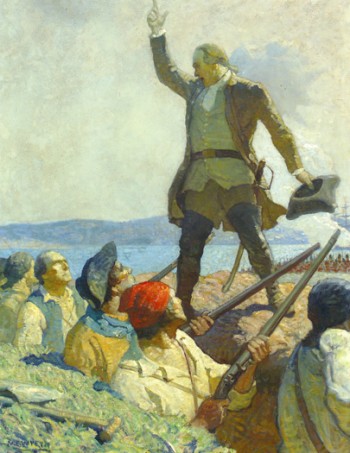by Joseph Palmer
“In Comtee of Safety, Watertown 25th July 1775…
“…the Commanders of the New England Army, had about the 14th ulto received advice, that Genl: Gage had issued orders for a Party of Troops under his command to take possession, very soon, of a place [ ] by the Name of post themselves on Bunkers-Hill, being a promontory just at the entrance of the peninsula of Charlestown; which orders were soon to be executed: upon which — they it was determined, with the advice of this Comtee, to send a Party who might erect some Fortifications upon said Hill, & prevent this design of our enemies; accordingly of the 16th ult: orders were issued that a detachment of 100 men should that evening march to Charlestown & entrench upon that hill: just before 9 o’clock they left Cambridge & marched proceeded to Breeds-Hill, situated on the farther part of the peninsula next to Boston, for by some mistake this Hill was marked out for the entrenchment instead of the other: as many things were necessary to be done preparatory to the entrenchments being thrown up, which could not be done before, lest the Enemy should discover & defeat the design;…” “…work commenced about 12 o’clock…by dawn they had thrown up a redoubt, about 8 rods square;…”
“…the Provincials waited within their entrenchments impatiently waited for the attack of the Enemy, & reserved their fire ’till they came within 10 or 12 rods, & there began a very brisk furious fire discharge of small arms upon them; this fire arrested the Enemy which they for some time returned, without advancing a step & then retreated in very great disorder disorder & great percipitation to the place where they landed & some of them ran sought refuge even into within their Boats;…”
“…the enemy came within 5 or 6 rods, & a second time put the regulars to flight, who ran within great precipitation confusion to their Boats;…”
“…attacked the redoubt on three sides at once…the Ammunition of the Provincials was expended, their few of their arms were not all fixed with Bayonets…” “The retreat of this little handful of brave men, would have been effectually cut off, had it not happened, that a flanking Party..was checked by a Party of Provincials, who fought with the utmost bravery & kept them from advancing farther than the Beach:…”
“With very great Signs of exultation exultation ridiculous parade of Triumph, the ministerial troops again took possession of the Hill…”
“1500 (ninety two of which were officers) were killed or wounded & about 1200 of them either killed or mortally wounded;…”
“The loss of the New England Army amounted, according to an exact return, to 145 killed & missing, & 304 wounded; thirty of the first were wounded & taken prisoner by the Enemy; among the dead was Majr Genl Joseph Warren, a man whose memory will be dear endeared to his countrymen, & to the worthy in every part and age of the world, for long as Virtue his character shall be known and Valour shall be asteemed among mankind; the worthy heroic Colo: Gardner of Cambridge has since died of his Wounds…”
“…we wish for no further effusion of blood; if the freedom & peace of America can be secured without it; but if it must be otherwise, we are determined to sacrifice Struggle everything that is dear to us, even we distain Life itself, to the without cause of Liberty.”
– J. Palmer &c.”
Source: Account of the Battle of Charlestown, July 25, 1775, Boston: Massachusetts Historical Society, Special Collections – Palmer. These excerpts, with insertions, corrections, and underlining found in the original, are from Dr. Forman’s transcription of the original manuscript.
Commentary: This letter was transmitted to London to American representative Arthur Lee, Esq. from Joseph Palmer, Massachusetts Committee of Safety. In my transcript of the draft manuscript, we can appreciate, by way of insertions and corrections, the careful choice of words and characterizations of the action.
By this time General George Washington had taken command of the recently established Continental Army. The views expressed in this draft reflect how the recent Battle of Bunker Hill, which was fought on June 17, 1775, was thought of among Patriot leaders, and how they wanted the conflict to be understood in England.
In some respects it is surprisingly candid in a context of heated passions and what one might expect to be a Patriot propaganda piece. The fortification on Breed’s Hill is characterized as a mistake. The tactical consequences of the Patriots’ lack of bayonets and gunpowder are forthrightly described. The British cheer at victory is mocked as a “ridiculous parade of Triumph.” It would certainly seem so in light of the lopsided casualty enumeration.
Joseph Palmer notes Joseph Warren’s battlefield demise as especially impactful and meaningful to posterity. Interestingly, Warren is identified as a major general, a title not formalized or reflective of command structure at the time of the battle. His commission as major general not yet confirmed, Joseph Warren insisted as fighting alongside the enlisted militiamen in the course of the battle. Joseph Palmer, an active member of the Massachusetts Provincial Congress’ Committee of Safety since late 1774, certainly knew this. Palmer’s official description of the fighting at Lexington and Concord, written while the battle was in progress on April 19, 1775, was ridden via express to the Second Continental Congress. The latter description was widely disseminated as news of the outbreak of war at the time, and has been well known to historians and scholars since.

 Follow
Follow